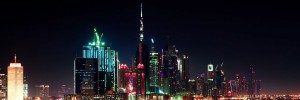By Richard Read www.oregonlive.com
At least one Oregon exporter defied gravity in 2009, getting its products a half mile in the sky above Dubai during a year when the state’s foreign sales sank.

Workers at Warm Springs Composite Products mixed a patented brew of earth, fiberglass and recycled newspaper to make fire-resistant-rated door parts for the Burj Khalifa, which opened recently as the world’s tallest building.
The components reached the Persian Gulf emirate via Malaysia, where workers completed the doors. They earned the company on the Warm Springs Indian Reservation more than $1 million. But Jacob Coochise, the central Oregon venture’s global business development director, says the doors’ presence in the 2,717-foot Burj makes them worth far more.
“It was a big job that did a lot for us,” Coochise says. “For us to be able to say we supplied the material for that particular project carries a lot of weight.”
Exports tend to support relatively high-paid jobs and can generate sales when U.S. markets slow. President Barack Obama pledged in his State of the Union speech to double U.S. export growth during the next five years, which he said could create 2 million jobs.
Trade experts doubt the goal can be reached unless China dramatically appreciates its currency, the global economy surges and the United States gives tax breaks to exporters and relaxes controls on shipments of military goods.
In Oregon, exports declined 23 percent in 2009 to $14.9 billion due to the global recession. But the improbable international success of the door business owned by the Confederated Tribes of Warm Springs gives grounds for hope.
Scott Goddin, director of the U.S. Commerce Department export-assistance center in Portland, says the Obama administration has requested budget increases for the U.S. Commercial Service and other agencies that support exports.
Goddin’s agency, and state economic-development officials, helped Warm Springs get started abroad. “But it really does take somebody who’s aggressively entrepreneurial,” Goddin says, “to identify and pursue opportunities like this one.”
Warm Springs Composite Products, founded in 1993, claims to be the nation’s leading supplier of fire-rated door and frame components. The company’s 55 jobs make a dent in a reservation unemployment rate that hovers above 60 percent, according to tribal officials.
Until six years ago, foreign sales accounted for 1 percent of the company’s business. Exports now make up about a third of its $8 million in annual sales, which have grown during each of the past five years.
Warm Springs exports to China, Southeast Asia and Europe. The Bahrain World Trade Center and the Bellagio Las Vegas hotel complex feature its door products.
Coochise says companies interested in exporting should determine which of their products are marketable abroad and try selling one or two items at first. His company is eyeing India, where he says new fire regulations and enforcement create the kind of opportunities that opened Dubai a decade ago.
Workers at Warm Springs Composite Products — 85 percent of whom are tribal members, or married into the tribes — don’t manufacture the doors and frames. They make products including Tectonite, a dense compound that goes inside doors. Much of the raw material is mined in Nevada.
In this case, the workers shipped the base component and core material to a Malaysian plant, which applied wooden skins and edge bands, machining and finishing the doors.
“I think it was over 3,000 door sets,” Coochise says. “There’s a lot of openings in that building.”
Warm Springs landed the job primarily because the Burj Khalifa’s architect was based in the United States, meaning they required U.S-certified products. But the company also produces material for doors to pass British certification.
The $1.5 billion Burj rises more than 1,000 feet higher than the world’s next-tallest building, the Taipei 101 tower in Taiwan. The Dubai skyscraper, with 160 habitable floors, opened in January.
“I’ve been up somewhere around the 40th floor,” says Coochise, who spent May and June last year working in Dubai. “At that time they were still putting up the cladding, so you actually couldn’t see out.”
He did visit an observation post on a nearby 63-story tower. “You look straight across,” he says, “and there’s the Burj. But you’re not even halfway up.”
Coochise, 36, a tribal member, has helped the Warm Springs company add new products during almost 13 years working there. Next the company plans to add fire-rated, bulletproof doors.
Coochise plans a business trip soon to India and to Jordan, where a manufacturer will start making doors using Warm Springs material.
He’ll also visit Dubai, where the company has a sales office. It’s a long way from the Warm Springs reservation. As Coochise says, “most places are.”
Coochise is not afraid of heights. But he doesn’t plan to stay in the Burj’s hotel.
“It might be a little more than my budget will allow,” Coochise says. “I definitely want to go back and at least go up on the observation deck and take a look.”












